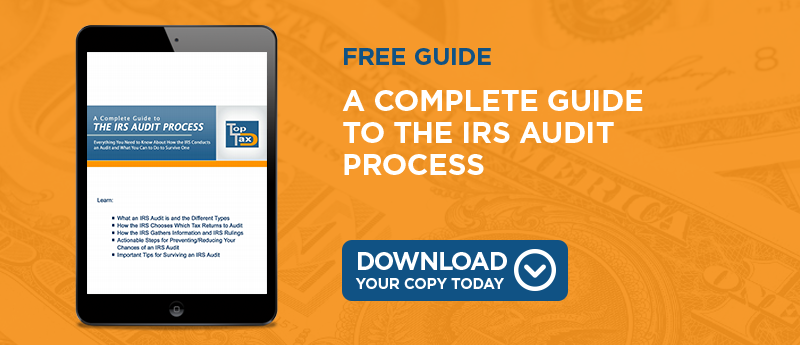
IRS tax audits are difficult processes for any taxpayer to endure. Unfortunately, some tax returns tend to get audited more frequently than others. Finding out which types of returns are likely to get audited can help some taxpayers prepare themselves for a possible audit. If your account is one that is flagged for an audit you'll also need to enlist qualified audit representation to assist you during the procedure.
Potential Audit Red Flags
The vast majority of American taxpayers won't ever be audited since the IRS tends not to audit average income returns. However, individuals who report an income of $1 million or more are far more likely to receive a deeper review by the IRS. The agency also tends to audit returns that report a far larger amount of deductions than income.
In addition, claiming specific tax credits may also tend to cause your return to be audited. The Earned Income Credit and the Adoption Credit are two credits that are often fraudulently claimed so the IRS is far more likely to audit returns that claim these particular credits. However, if you're entitled to these credits you shouldn't hold back from claiming them for fear of an audit.
How to Handle an Audit
If you are one of the few who are flagged for an audit it's always best to get professional audit representation. The IRS may conduct a lengthy and thorough investigation into your financial circumstances so you'll need all the help you can get to sort through your finances and gather any supporting documentation and receipts. When you're searching for a professional tax expert to assist you in your audit, seek out a qualified resolution specialist with experience in handling audits. If your return includes an unresolved tax debt of $20,000 or more you're in particular need of expert audit representation.
The vast majority of American taxpayers won't ever be audited since the IRS tends not to audit average income returns. However, individuals who report an income of $1 million or more are far more likely to receive a deeper review by the IRS. The agency also tends to audit returns that report a far larger amount of deductions than income.
In addition, claiming specific tax credits may also tend to cause your return to be audited. The Earned Income Credit and the Adoption Credit are two credits that are often fraudulently claimed so the IRS is far more likely to audit returns that claim these particular credits. However, if you're entitled to these credits you shouldn't hold back from claiming them for fear of an audit.
How to Handle an Audit
If you are one of the few who are flagged for an audit it's always best to get professional audit representation. The IRS may conduct a lengthy and thorough investigation into your financial circumstances so you'll need all the help you can get to sort through your finances and gather any supporting documentation and receipts. When you're searching for a professional tax expert to assist you in your audit, seek out a qualified resolution specialist with experience in handling audits. If your return includes an unresolved tax debt of $20,000 or more you're in particular need of expert audit representation.
Correcting a Preparation Mistake
Many IRS tax audits are caused by improper reporting or mistakes during the tax preparation process. To avoid these errors it's important that you read the form instructions carefully and double check your figures to make sure you avoid reporting incorrect totals. If you're audited due to an error on your return, however, you may be able to avoid getting hit with additional penalties if you come clean to the IRS right away.
An IRS tax audit can be a harrowing experience but you may be able to avoid one altogether. By carefully preparing your forms, checking your figures and only claiming deductions to which you're entitled.
Many IRS tax audits are caused by improper reporting or mistakes during the tax preparation process. To avoid these errors it's important that you read the form instructions carefully and double check your figures to make sure you avoid reporting incorrect totals. If you're audited due to an error on your return, however, you may be able to avoid getting hit with additional penalties if you come clean to the IRS right away.
An IRS tax audit can be a harrowing experience but you may be able to avoid one altogether. By carefully preparing your forms, checking your figures and only claiming deductions to which you're entitled.




